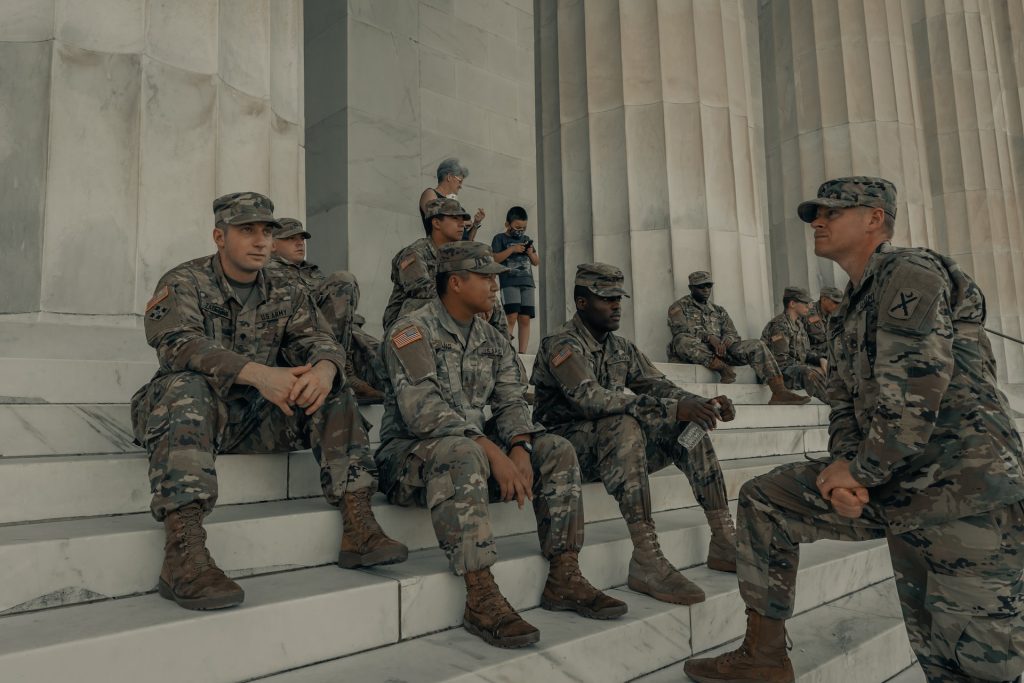Table of Contents
- What is the Army Reserve versus Active Duty Service?
- What are the eligibility requirements to join the Army Reserve?
- How does serving in the Army Reserve impact my civilian career?
- What are the benefits of joining the Army Reserve?
- Is the Army Reserve a good option for current college students?
- What is the pay structure for Army Reserve soldiers?
- What kind of education benefits are available to Army Reserve soldiers?
- How does serving in the Army Reserve affect my GI Bill benefits?
- Can a civilian employee of the federal government serve in the Army Reserve?
- What kind of medical and dental benefits are available to Army Reserve soldiers?
- How does serving in the Army Reserve impact my retirement benefits?
- What is the deployment process for an Army Reserve soldier?
The Army Reserve is a component of the United States Army that provides a unique opportunity for people to serve the country while maintaining their civilian careers and lifestyle.
One of the most significant Army Reserve benefits is the opportunity to earn additional income. Soldiers are paid for their training time, and those who complete their initial training are eligible for enlistment bonuses and tuition assistance for continuing education. Additionally, the Army Reserve offers a comprehensive healthcare plan for soldiers and their families
There is a variety of Army Reserve benefits for soldiers, including additional income, healthcare, career development, retirement benefits, and family support. It is an excellent way for individuals to serve their country while maintaining their civilian careers and lifestyle.
What is the Army Reserve versus Active Duty Service?
The Army Reserve is a component of the United States Army composed of part-time soldiers trained to be ready to serve when needed. Army Reserve soldiers typically serve one weekend per month and two weeks per year while also being available to serve when called to active duty.
On the other hand, active duty service involves serving full-time in the military, often in locations around the world. Active duty soldiers have a longer initial training period and can be deployed longer than Army Reserve soldiers.
While both Army Reserve and active duty soldiers are part of the same military branch and have similar training, the difference lies in the amount of time spent in service and the level of commitment required.
What are the eligibility requirements to join the Army Reserve?
To join the Army Reserve, there are certain eligibility requirements that individuals must meet. Here are some of the basic requirements:
-
Age
-
Citizenship
-
Education
-
Physical fitness
-
Criminal history
-
Medical history
These are just some of the basic eligibility requirements for joining the Army Reserve. There may be additional requirements based on specific job or training requirements.
How does serving in the Army Reserve impact my civilian career?
Serving in the Army Reserve can impact your civilian career in several positive ways, including developing new skills and experiences, networking with a diverse group of individuals, and gaining leadership experience.
Many employers value the skills and qualities developed through military service, including teamwork, discipline, and problem-solving abilities. Employers are also required by law to provide job protection and re-employment rights for employees called to active duty.
The Army Reserve offers a variety of education benefits, including tuition assistance, the GI Bill, and scholarship opportunities, which can help you further your education and career.
What are the benefits of joining the Army Reserve?
Joining the Army Reserve comes with a range of benefits. Here are some of the key Army Reserve benefits you can expect:
-
Training and professional development
-
Education benefits
-
Health and life insurance
-
Retirement benefits
-
Service to country
-
Flexibility
-
Career opportunities
It’s important to carefully consider these Army Reserve benefits and weigh them against the potential challenges and commitments of military service before choosing to join.
Is the Army Reserve a good option for current college students?
The Army Reserve can be a good option for current college students looking to gain experience, earn money, and serve their country. Here are some reasons why the Army Reserve might be a good option for college students:
-
Educational benefits
-
Financial stability
-
Career development
-
Flexibility
-
Leadership experience
It’s important to note that serving in the Army Reserve requires a significant commitment of time and energy.
College students who are considering joining should carefully weigh the Army Reserve benefits and challenges of military service and should discuss their options with a recruiter to determine if it’s a good fit for their personal and professional goals.
What is the pay structure for Army Reserve soldiers?
Army Reserve soldiers are paid based on their rank and time in service. The pay structure for Army Reserve soldiers is designed to be competitive with civilian jobs and provide financial stability for soldiers and their families.
It’s important to note that while the Army Reserve salary can be a significant benefit, serving in the Army Reserve is a commitment that requires a significant amount of time and effort.
Here’s a breakdown of the Army Reserve salary:
-
Base Pay. Army Reserve soldiers receive base pay, which is determined by their rank and time in service. Base pay is the same for Army Reserve soldiers as it is for active-duty soldiers. The base pay chart can be found on the Defense Finance and Accounting Service website.
-
Drill Pay. Army Reserve soldiers are required to attend regular drills and training. Soldiers are paid for their time at these drills, which is called “drill pay.” Drill pay is calculated based on the number of drills attended and the soldier’s rank.
-
Special Pay and Bonuses. Army Reserve soldiers may be eligible for special pay or bonuses, depending on their job and qualifications. These may include bonuses for reenlisting or enlisting in certain career fields, taking on hazardous duty, or other special circumstances.
-
Allowances. Army Reserve soldiers may be eligible for allowances to help cover the cost of housing and food. These include Basic Allowance for Housing (BAH), Basic Allowance for Subsistence (BAS), and Family Separation Allowance (FSA).
What kind of education benefits are available to Army Reserve soldiers?
The Army Reserve offers a range of educational benefits to soldiers, including:
-
Montgomery GI Bill (MGIB). The MGIB offers education benefits to active-duty and selected reserve service members. The benefit can be utilized for certificate programs and degrees, apprenticeship and on-the-job training, as well as correspondence courses. Eligibility for the MGIB is based on time in service and other criteria.
-
Post-9/11 GI Bill. The Post-9/11 GI Bill offers education benefits to service members who have served actively for at least 90 days after September 10, 2001. The benefit can be used for degree and certificate programs and some vocational training programs.
-
Tuition Assistance (TA). The Army Reserve offers tuition assistance to help soldiers pay for college or vocational training. Eligible soldiers can receive up to 100% of tuition and fees, up to a maximum amount per semester or quarter.
-
Army Credentialing Assistance (CA). The Army CA program provides funding for soldiers to obtain industry-recognized credentials or licenses. The program can help soldiers gain skills and certifications that can enhance their military or civilian careers.
-
Army Reserve Officers’ Training Corps (ROTC). Army ROTC is a college program that provides leadership training to cadets. The program offers scholarships to eligible students and can lead to a commission as an officer in the Army Reserve or active duty Army.
How does serving in the Army Reserve affect my GI Bill benefits?
Serving in the Army Reserve can affect your GI Bill benefits in a few ways. Here are some key points to keep in mind:
-
Montgomery GI Bill (MGIB). The amount of Army Reserve benefits you earn is prorated based on your length of active duty service. You can also use your MGIB benefits while serving in the Army Reserve as long as you meet certain eligibility requirements.
-
Post-9/11 GI Bill. The benefits are prorated based on your length of active duty service. You can also use your Post-9/11 GI Bill benefits while serving in the Army Reserve as long as you meet certain eligibility requirements.
-
Reserve Educational Assistance Program (REAP). REAP was a program that provided education benefits to reservists who were activated for certain periods of time in response to a national emergency. However, REAP ended in 2015 and was replaced by the Post-9/11 GI Bill.
Can a civilian employee of the federal government serve in the Army Reserve?
Yes, it is possible to serve in the Army Reserve while working as a civilian federal government employee. However, there are some important considerations to keep in mind.
It’s important to ensure that your military service does not interfere with your job duties as a federal employee. Also, there are some restrictions on the type of federal jobs that military members can hold. For example, there are limitations on military members serving in certain intelligence and national security positions.
You may be eligible for certain Army Reserve benefits as a federal employee who is also a member of the military, such as paid military leave or differential pay. These benefits can help to offset any financial impact of your military service.
What kind of medical and dental benefits are available to Army Reserve soldiers?
Army Reserve soldiers are eligible for a range of medical and dental benefits. These are as follows:
-
Tricare Reserve Select
-
Dental Insurance
-
Medical and dental care during drill weekends and annual training
-
Deployment-related medical care
-
Veterans Affairs (VA) medical and dental benefits
How does serving in the Army Reserve impact my retirement benefits?
Serving in the Army Reserve can impact your retirement benefits by earning retirement points that count towards eligibility for social security retirement benefits. To be eligible for retired pay, soldiers must earn at least 20 “good years” of service with at least 50 points earned in each year.
Retirement pay is based on the soldier’s length of service and rank at the time of retirement. In contrast, early retirement pay is calculated based on a formula that takes into account the soldier’s length of service and the average of their highest 36 months of basic pay.
The Blended Retirement System (BRS) is also available for any new Army Reserve soldier, and it includes a combination of defined benefit retirement pay and a Thrift Savings Plan (TSP) account. It’s important to work with a counselor or advisor to determine the best path for your retirement goals.
What is the deployment process for an Army Reserve soldier?
The deployment process for Army Reserve soldiers typically involves
-
A notification period several months in advance
-
Pre-deployment training that includes specialized training, weapons training, and cultural awareness training
-
Deployment to the mission location,
-
A post-deployment demobilization process
Deployments can range from a few months to a year or more, depending on the mission. The specifics of the process can vary based on the mission and the requirements of the unit.
Throughout the process, soldiers receive support from their unit and the Army Reserve to ensure success in the mission and a smooth transition back to civilian life.



